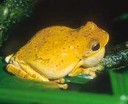Mahogany tree frog
| Mahogany tree frog | |
|---|---|

| |
| Scientific classification | |
| Domain: | Eukaryota |
| Kingdom: | Animalia |
| Phylum: | Chordata |
| Class: | Amphibia |
| Order: | Anura |
| Family: | Hylidae |
| Genus: | Tlalocohyla |
| Species: | T. loquax
|
| Binomial name | |
| Tlalocohyla loquax | |
| Synonyms | |
|
Hyla loquax (Gaige & Stuart, 1934) | |
The mahogany tree frog (Tlalocohyla loquax) is a species of frog in the family Hylidae found in Belize, Costa Rica, Guatemala, Honduras, Mexico, and Nicaragua.[2][3]
Its natural habitats are subtropical or tropical moist lowland forests, subtropical or tropical moist montane forests, freshwater marshes, intermittent freshwater marshes, pastureland, rural gardens, and heavily degraded former forests. It is threatened by habitat loss.[1]
The adult male frog measures 33 to 45 mm in snout-vent length and the adult female frog 38 to 47 mm. This frog has webbed skin on all four feet. This frog has bright yellow color on its back and some bright red near its vent and sides. This frog can change color, appearing yellow and orange at night and almost white during the day. This frog is nocturnal.[3]
The female frog lays eggs in deep bodies of water, about 250 per clutch. The eggs adhere to surface plants. After the tadpoles hatch, they swim downward.[3]
This frog is not in danger of dying out because it can live in many kinds of habitat so long as there is sufficient plant cover. Many of its habitats are in protected areas.[3]
References
[edit]- ^ a b IUCN SSC Amphibian Specialist Group (2020). "Tlalocohyla loquax". IUCN Red List of Threatened Species. 2020: e.T55541A53955884. doi:10.2305/IUCN.UK.2020-1.RLTS.T55541A53955884.en. Retrieved 14 November 2021.
- ^ Frost, Darrel R. "Tlalocohyla loquax (Gaige and Stuart, 1934)". Amphibian Species of the World, an Online Reference. Version 6.0. American Museum of Natural History. Retrieved March 15, 2022.
- ^ a b c d Nelly Chow (February 11, 2009). Kellie Whittaker (ed.). "Tlalocohyla loquax: Mahogany Treefrog". AmphibiaWeb. University of California, Berkeley. Retrieved March 16, 2022.

